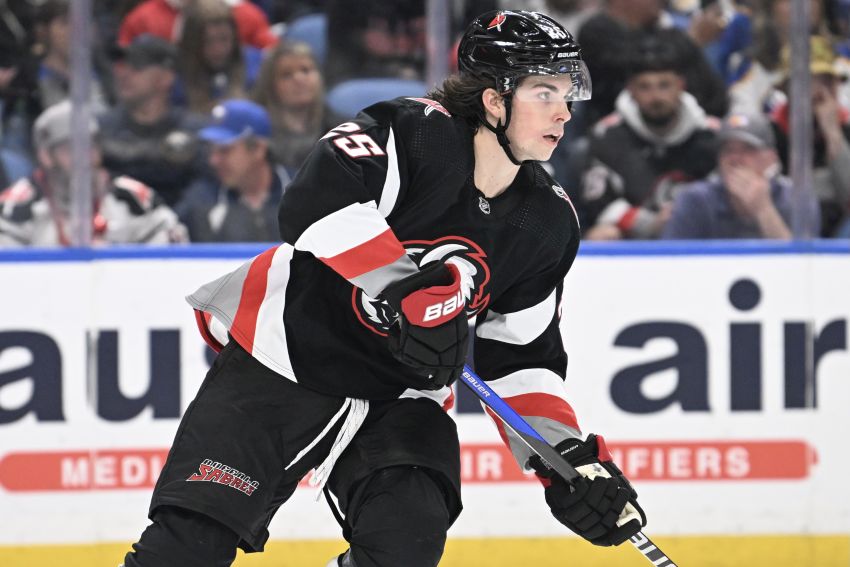BUFFALO – Throughout Sabres defenseman’s Owen Power’s terrific rookie season, his age often accompanied any mention of his exploits.
Can you believe the important minutes Power plays as a 20-year-old? Look at the poise and smarts he possesses for a 20-year-old.
Forget about his age, coach Don Granato said. Power’s first season was dynamic by any standard.
“What he did, 30-year-old guys in the league that have played 10, 12, 13 years can’t do,” Granato told the Times Herald on Wednesday. “That’s amazing. So it’s drop the age after everything you say because everything you said before, it’s amazing that an NHL player just does that consistently. Because you’re trying to do that with other players that have been in the league three years, four years, eight years.”
The 6-foot-6, 218-pound Power, who turned 20 on Nov. 22, is a finalist for the Calder Trophy at tonight’s NHL Awards in Nashville. Defensemen have won the award two of the last three years: the Detroit Red Wings’ Moritz Seider in 2022 and the Colorado Avalanche’s Cale Makar in 2020.
The Sabres have had three Calder winners in their history: center Gilbert Perreault in 1970-71, goalie Tom Barrasso in 1983-84 and defenseman Tyler Myers in 2009-10.
Power’s up against Seattle Kraken center Matty Beniers, who scored 24 goals and 57 points, and Edmonton goalie Stuart Skinner, who won 29 games and had a .914 save percentage.
Update: Beniers won the award. Power finished third. He earned a spot on the NHL All-Rookie Team.
Defense, of course, can be an overlooked position. And for as good as Power has quickly become, he’s not flashy.
Power’s basic statistics, while terrific, aren’t eye-popping. He compiled four goals, 31 points and plus-10 rating in 79 games in his first full NHL season.
Other numbers help illustrate his value and remarkable maturity. He averaged 23 minutes, 48 seconds of ice time a game, putting him first among NHL rookies and 30th overall. His total five-on-five ice time – a whopping 1,588 minutes – ranked fourth among all players. Only Erik Karlsson, Adam Larsson and Drew Doughty played more.
Since the league started tracking even-strength ice time in 1997-98, Power’s 20 minutes, 43 seconds a game ranks first among rookies.
Granato trusted Power, the first overall selection in 2021, so much the youngster started 56.3 percent of his faceoffs in the defensive zone.
Still, to truly appreciate Power, you probably need to examine him closely, perhaps pause and rewind footage over and over to spot the subtleties in his game and smarts he consistently showcases.
“I don’t think anybody will ever notice how good he is,” Granato said. “… Unfortunately, the defensive side, you’ve got to really watch and study guys to appreciate what they do.”
Granato appreciated Power the first time he saw him about five years ago. He was in Mississauga, Ontario, to watch center Jack Hughes, who would become the first pick in 2019, when a friend told him to check out a kid on a different rink.
“I ended up spending more time in the rink watching Owen, who was a year and a half younger,” Granato said.
Even at 15, Granato said Power “had skills that you have a very difficult time teaching and conveying and players understanding.”
Today, at 20 – there’s the age again – Granato said his “situational awareness is already as good as anybody’s in the NHL.”
“Like (a) 35-year-old NHL player that’s been through situations thousands and thousands of times,” he said. “He recognizes situations and internalizes them to the point that his … situational awareness is elite.”
Power’s ability to quickly process each facet of the game helped him jump into the world’s best hockey league and make an immediate impact.
“A gap to a defenseman … might look like the same gap,” Granato said. “To him, it’s a different situation. Does the guy have a partner with him? What’s the speed? What’s the space between him and I? He’s constantly calculating saying, ‘OK, here is the situation, here is how I can play it, and here is how I can be assertive.’ Or, ‘I can’t be assertive in this situation, I have to delay and influence it. I can’t dictate, I have to influence.’
“And he just picks up on those concepts so well, again, because of his awareness. And that doesn’t happen without him being able to self-reflect, his capacity for learning and teaching himself, and then just observation. He’s a very observant guy.”
Sometimes Power might simply read the landscape and fake a pass that backs off the pressure. If you look away for a second, you could miss it. But it impacts the game.
“He’s making everybody else’s job on the ice easier and more efficient,” Granato said. “And you have to study it – really study it – slow the film down to see how he’s manipulating … the opponents when he’s doing these things, and that is spectacular. And he did that when he was 15 years old.”


